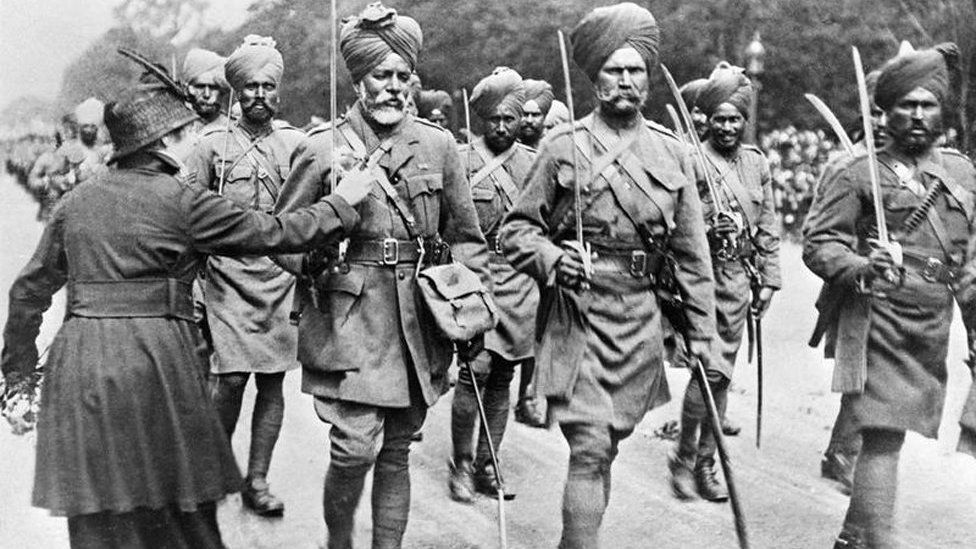Government apologises over failure to commemorate black and Asian troops
The government has apologised for failures to properly commemorate black and Asian troops who died in World War One fighting for the British Empire.
Some troops were commemorated collectively or their names were recorded in registers, while their white counterparts had headstones.
A report by the Commonwealth War Graves Commission found the reason for this was "pervasive racism".
In the Commons, Defence Secretary Ben Wallace expressed "deep regret".
He told MPs there was "no doubt" prejudice had played a part in what happened after WW1.
The Commonwealth War Graves Commission, which is tasked with commemorating those who died in the two world wars, has also apologised over its findings.
Mr Wallace said: "On behalf of the Commonwealth War Graves Commission and the government both of the time and today, I want to apologise for the failures to live up to their founding principles all those years ago and express deep regret that it has taken so long to rectify the situation.
"Whilst we can't change the past, we can make amends and take action," he said.
He said there were cases where the commission "deliberately overlooked evidence" that would have allowed it to find the names of the dead.
And he said there were examples of officials employing an "overarching imperial ideology connected to racial and religious differences" in order to "divide the dead and treat them unequally in ways that were impossible in Europe".
Outlining the next steps, Mr Wallace said the Commonwealth War Graves Commission will:
- search in the historical record for inequalities in commemoration and act on what is found
- renew its commitment to equality in commemoration by building physical or digital commemorative structures
- use its online presence and wider education activities to reach out to all the communities of the former British Empire touched by the two world wars to make sure their hidden history is brought to life
- and, over the next six months, assemble a global and diverse community of experts to help make this happen
Mr Wallace also announced a public consultation over plans to waive the visa fee for service personnel from the Commonwealth and Nepal who choose to settle in the UK in order to honour their contribution.
An inquiry by the commission was set up following a 2019 Channel 4 documentary, called Unremembered, which was presented by Mr Lammy.
The report found that at least 116,000 casualties from WW1, most of whom were of African, Indian or Egyptian origin, "were not commemorated by name or possibly not commemorated at all".
But that figure could be as high as 350,000, it said.
It also cited racist comments such as the governor of a British colony saying in 1923 that: "The average native... would not understand or appreciate a headstone."
Shadow justice secretary Mr Lammy told the BBC that while making the documentary in Kenya and Tanzania, he discovered mass graves in which Africans had been "dumped with no commemoration whatsoever".
He said it was a travesty that men who served the British Empire were not commemorated properly, but welcomed the report.
"I'm just really, really pleased that the dignity that these men deserved - who were dragged from their villages and commandeered to work for the British Empire - that dignity that they deserve in death can be granted to them," he said.
Mr Lammy added that work must be done to find their names in archives where that is possible, and to establish how local communities would like them to be commemorated.
He also said Commonwealth soldiers should not be "whitewashed" out of history books, while Mr Wallace said it was a "deep regret" that his own WW1 education had included "very little about the contribution from the Commonwealth countries and the wider at the time British Empire".
Historian Prof David Olusoga, whose TV company produced Unremembered, told BBC Breakfast that apologies were not enough and resources would need to be committed if the commission was serious about restorative justice.
"If the Commonwealth War Graves Commission had set up a committee and discovered that 100,000 white British soldiers lay in mass graves - unmarked, uncommemorated - and the documentation proved that that had been deliberate, what would they do?" he said.
Six million soldiers from the British Empire served in WW1.
Between 45,000 and 54,000 Asian and African personnel who died in the conflict were "commemorated unequally", the commission said.
What was the role of British Empire soldiers in WW1?
- World War One was the first truly global war, fought not just in the trenches of France but in the Middle East, Asia and Africa
- Britain's colonies sent millions of men to fight for the empire during the conflict
- India, which at that time included Pakistan and Bangladesh, sent the most soldiers - more than 1.4 million
- The British Army in East Africa was mainly composed of African soldiers by November 1918, according to the Imperial War Museum
- At least 180,000 Africans served in the Carrier Corps in East Africa and provided logistic support to troops at the front
- Around 15,000 people from the West Indies enlisted in WW1, including 10,000 from Jamaica, according to the National Army Museum
- Colonies as far away as Canada, Australia, New Zealand, South Africa and Rhodesia (now Zimbabwe) also sent a similar number between them
- Britain had soldiers from six different continents: Europe, North America, South America, Australasia, Asia and Africa
https://www.bbc.com/news/uk-56840131





Post a Comment